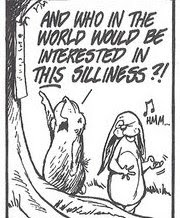So, as noted at #4 in the last post, I'm reading A. C. Spearing's Textual Subjectivity, because I think it might be useful for The Dissertation, and I need something to do while my students are taking their Awesome Test. And I'm trucking along through the book, reading some intersting things about narrator theory and subjectivity, and then I hit this:
Modern readings of Chaucer in particular tend to focus on psychology and ideology, even when these obscure or explicitly deny the qualities that have made it a pleasure to read his work and have kept it alive over the centuries. One thing that emerges from a study of interpretations of Troilus and Criseyde and The Man of Law's Tale is that many recent scholars do not allow their judgments to be guided by the pleasure-giving power of Chaucer's poetry, and sometimes seem actively to resist and dislike it. I hope the present investigation will not lose touch entirely with the primitive and indispensable goal of pleasure (34).My response to this is "so what?" While I do not deny that there might be pleasure in reading Troilus and Criseyde or Pearl or even Ancrine Riwle, the pleasure of reading would seem to have a rather limited place in textual criticism. Certainly you need to enjoy the text you're reading in order to endure it long enough to critique it, but pleasure itself is too subjective a response to be useful after that moment. Expressing one's like or dislike for a text then seems secondary to the goal of explaining something about what a text does and how it does that. We are, for the most part, no longer pure formalists, finding joy in the how of a text and never asking why a text might do what it does. Indeed, allowing one's "judgments to be guided by the pleasure-giving power of . . . poetry" might even be problematic: what happens when one finds pain, or discomfort, or that moment of outright unheimlich in the poetry? Do we turn away because it is no longer a source of joy? Rather, these are the moments on which we linger, the moments where we become confused or uncomfortable, the moments that demand the "why" of criticism. In this sense, an aesthetic judgment may be necessary, but it does not seem to be quite the "end all" that Spearing seems to suggest here.
I realize that this may be far from what Spearing was arguing in this passage, and of course I am not done with the book, but this gut-reaction reductio doesn't seem so absurd as it might. In any event, the question remains: why make this textual move here, where it seems so out of place?
I am also aware of the metatexual nature of this musing, in that a moment of textual weirdness in Spearing's work incited me to discourse—thereby demonstrating my point that perhaps we get more discourse out of the odd than out of the pleasurable. Derevaun seraun, as Joyce said, and the end of that is criticism.

